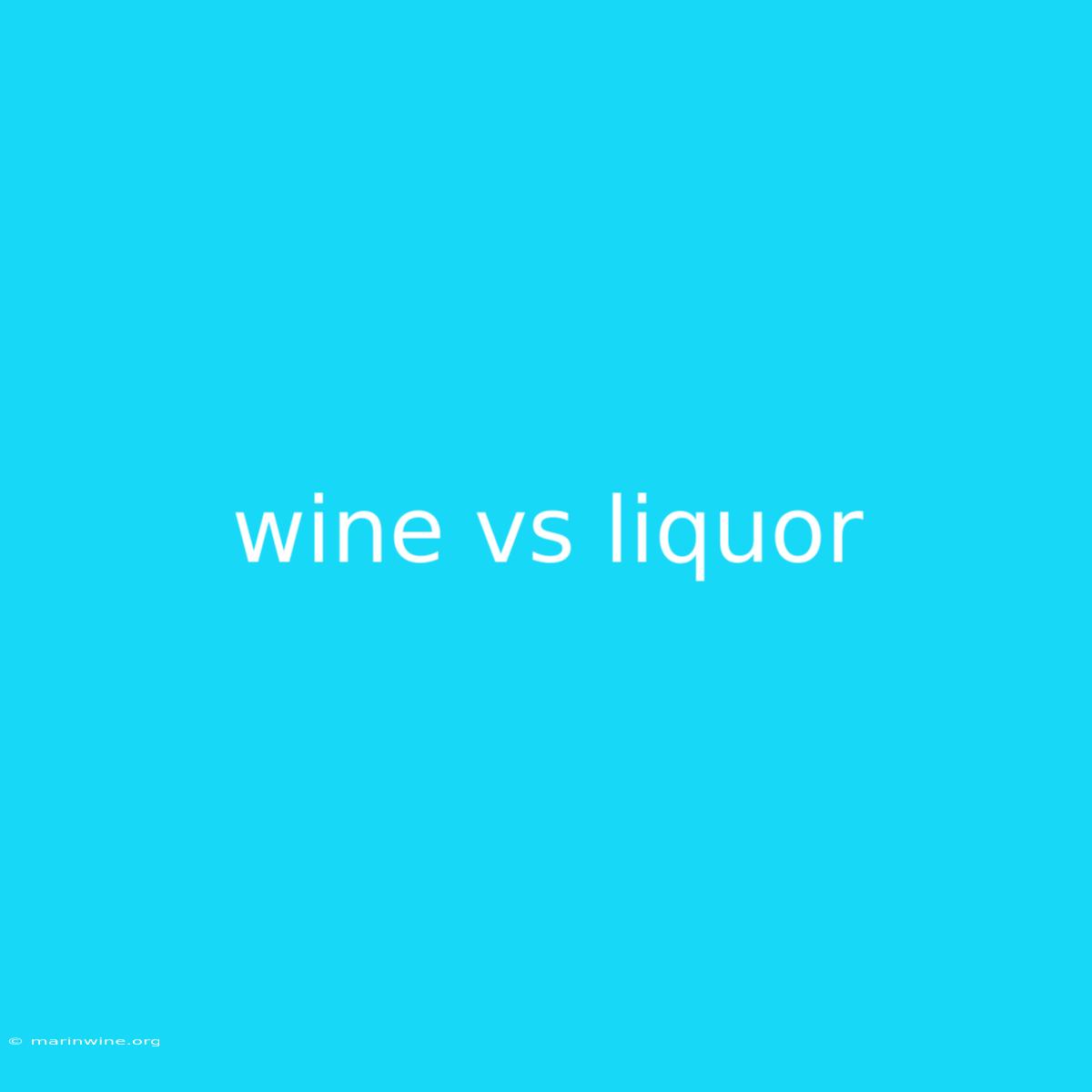Wine vs. Liquor: Uncorking the Differences
Have you ever wondered what the real difference is between wine and liquor? It’s a question many drinkers ponder, especially when navigating a crowded bar or a well-stocked liquor store. While both offer a delightful range of flavors, they are fundamentally distinct, each possessing unique characteristics and production methods.
Why It Matters
Understanding the differences between wine and liquor is vital for any discerning drinker. This knowledge allows you to make informed choices, appreciate the nuances of each beverage, and ultimately enhance your drinking experience.
This article will explore the key characteristics, production methods, and even the historical significance of both wine and liquor, unraveling the fascinating world of alcoholic beverages.
Key Takeaways of Wine vs. Liquor
| Feature | Wine | Liquor |
|---|---|---|
| Base | Fermented grape juice | Fermented grains, fruits, or other ingredients |
| Alcohol Content | Typically 10%-15% | Typically 20%-60% |
| Production | Fermentation | Fermentation followed by distillation |
| Aging | Usually aged in oak barrels | Often aged in oak barrels or other containers |
| Flavor Profile | Varies widely depending on grape variety, region, and production techniques | Varies widely depending on base ingredients, distillation methods, and aging |
| Serving | Usually served chilled or at room temperature | Often served neat, on the rocks, or in cocktails |
Wine
Wine is a fermented alcoholic beverage primarily made from grapes. The process of fermentation involves converting the natural sugars in grapes into alcohol and carbon dioxide through the action of yeast. The resulting wine can vary significantly in flavor, color, and alcohol content based on the grape variety, growing region, and production techniques.
Key Aspects of Wine:
- Grape Variety: The grape variety significantly impacts the flavor profile, color, and overall character of the wine. For instance, Cabernet Sauvignon is known for its full-bodied red wine with dark fruit flavors, while Sauvignon Blanc produces a crisp white wine with citrus and grassy notes.
- Terroir: Terroir refers to the unique combination of environmental factors, including soil, climate, and elevation, that influence the taste of grapes. This concept highlights the importance of geographical origin in shaping the character of a wine.
- Winemaking Techniques: From the selection of grapes to the fermentation process and aging methods, each stage in winemaking contributes to the final product. Different techniques can result in wines with diverse aromas, textures, and complexities.
Liquor
Liquor, also known as spirits, is an alcoholic beverage created through the distillation process. Distillation involves heating a fermented liquid to evaporate the alcohol, which is then collected and condensed to create a higher-alcohol concentration. This process produces a wide range of spirits with diverse flavors and strengths, depending on the base ingredients, distillation methods, and aging.
Key Aspects of Liquor:
- Base Ingredients: The primary ingredients used in liquor production can range from grains like barley and wheat to fruits like agave and sugarcane. These base ingredients determine the fundamental flavors and aromas of the final spirit.
- Distillation Methods: Different distillation methods, such as pot still and column still, contribute to the unique character of a spirit. Each technique influences the purity, concentration, and flavor profile of the final product.
- Aging: Many liquors are aged in oak barrels for varying periods. This process allows the spirit to interact with the wood, extracting tannins and developing complex flavors.
Connecting the Dots
Although seemingly different, both wine and liquor share some commonalities. Both rely on the process of fermentation as a fundamental step in their production. Additionally, both often involve aging in oak barrels to enhance their flavor and complexity.
FAQ
Q: What are the health implications of consuming wine and liquor?
A: Both wine and liquor can have positive and negative health impacts. Moderate wine consumption has been linked to potential cardiovascular benefits, while excessive drinking of any alcoholic beverage can lead to health issues like liver disease, heart problems, and increased cancer risk.
Q: How do I choose the right wine or liquor for my palate?
**A: ** Start by exploring different varieties and brands to discover your preferred flavors. Experiment with various wines, from light and fruity to bold and complex, and explore the diverse world of spirits, from smooth vodkas to smoky whiskies. Don't be afraid to ask for recommendations from knowledgeable staff at liquor stores or bars.
Q: Can wine and liquor be combined?
A: While combining wine and liquor isn't a traditional practice, some cocktails incorporate wine as an ingredient. However, it's essential to use high-quality ingredients and maintain a balance of flavors to create a harmonious experience.
Tips for Wine and Liquor Enthusiasts
- Invest in a good wine opener and bottle stopper to ensure you can enjoy your wine without any hassles.
- Explore wine tasting events to learn about different grape varieties and production regions.
- Experiment with different cocktails to discover new ways to enjoy your favorite spirits.
- Start a liquor collection with spirits from various countries and production methods.
- Pair wine and liquor with food to enhance both the flavor of the food and the beverage.
Summary of Wine vs. Liquor
Wine and liquor, while both offering delightful alcoholic experiences, are distinct beverages with unique production methods and flavor profiles. Wine is fermented grape juice, while liquor is distilled from fermented grains, fruits, or other ingredients. Each beverage offers a vast range of possibilities for exploration and enjoyment. By understanding the nuances of each, you can make informed choices and appreciate the diverse world of alcoholic beverages.
Enjoy responsibly and savor the rich flavors of both wine and liquor!

